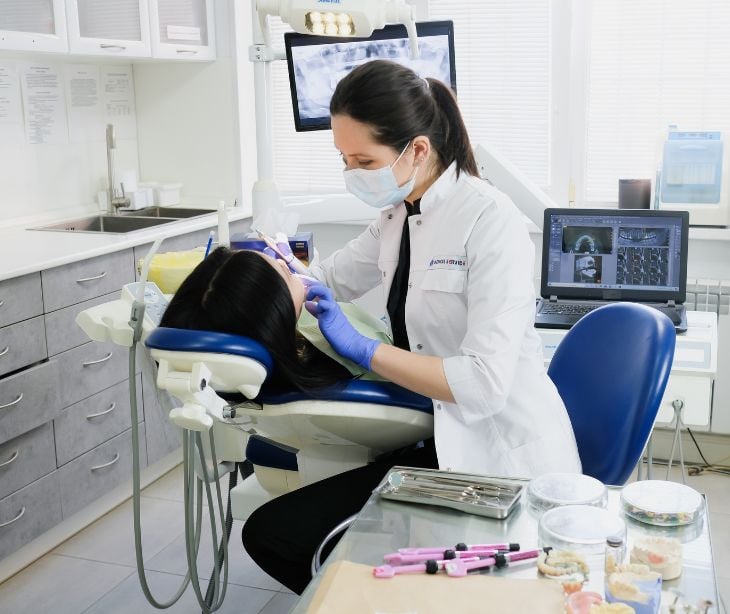
While a dental practice can acknowledge a patient's review, it must be done in a way that maintains compliance with HIPAA regulations regarding patient privacy and confidentiality. Any response should avoid disclosing specific personal health information or any information that could potentially identify the patient.
Dentists should maintain a general and non-identifying approach when publicly acknowledging patient reviews to protect their privacy.
The American Dental Association's policies on reviews
The American Dental Association (ADA) has released a toolkit to help dental practices respond to reviews and caution that responses should remain general.
The ADA states, "Responding is even more complicated in healthcare since patient confidentiality must always be maintained. Be mindful that privacy laws apply. If you choose to respond, it's best to do so in very broad 'all patient' terms."
Unlike in other healthcare industries, the ADA does not discourage dental practices from soliciting reviews, saying, "In general, people are more likely to leave a review if they had a negative experience — which is why soliciting positive reviews can help paint a more accurate picture of the average patient's experience. You can encourage patients to leave truthful reviews."
Best practices for responding to online reviews
1. Protect patient information
Protected health information (PHI) includes any individually identifiable health information, this includes:
- Names
- Contact details
- Treatment records
Dentists have a legal and ethical obligation to safeguard patient privacy by not disclosing patient information without explicit permission.
2. Responding by using general policies and procedures
By discussing general policies and standard protocols, dentists can provide meaningful responses to online reviews while respecting patient privacy and complying with HIPAA regulations. This approach allows dentists to engage in constructive dialogue, address concerns, and educate patients without disclosing patient-specific information.
3. Regularly monitor reviews
Regularly monitoring online reviews and promptly responding to patient concerns or complaints is a proactive approach that allows dental practices to address patient feedback, improve patient experience, build trust, mitigate negative impacts, enhance online reputation, and engage positively with patients. Dentists should allocate time and resources to effectively manage and respond to online reviews to maintain a positive online presence and patient satisfaction.
4. Develop internal policies and procedures for online review responses
Internal policies and procedures should align with HIPAA regulations to protect patient privacy and safeguard PHI. Clearly outline the expectations and requirements for staff members regarding the management of online reviews while maintaining HIPAA compliance.
By developing internal policies and procedures for managing online reviews, dental practices can establish a framework that promotes HIPAA compliance, protects patient privacy, and provides clear guidelines for staff members. These policies ensure a consistent approach to online review management.
5. Staff training and regular audits
Training sessions educate staff on HIPAA regulations, patient privacy, and appropriate responses to reviews. At the same time, audits assess compliance and identify areas for improvement. Dental practices can maintain compliance by staying updated on regulations, protecting patient privacy, and continuously improving review management processes.
Related: Who needs to take HIPAA training?
Potential violations in online reviews
- Unauthorized disclosure of PHI: Sharing patient-specific information, such as names, diagnoses, treatment details, or other identifying information, in response to an online review without obtaining the patient's explicit consent.
- Improper handling of patient information: Failing to take appropriate measures to safeguard patient information during online interactions, including comments, responses, or discussions on review platforms or social media.
- Inadequate staff training: Neglecting to provide sufficient training to staff members on HIPAA regulations, patient privacy, and the specific guidelines for managing online reviews, leading to unintentional disclosures or breaches.
- Failure to monitor and address reviews promptly: Not regularly monitoring online reviews and failing to promptly respond to patient concerns or complaints could result in delayed resolution or potential escalation of issues.
- Insufficient policies and procedures: Lacking internal policies and procedures that clearly outline guidelines for staff members on appropriate responses to online reviews, maintaining patient privacy, and ensuring compliance with HIPAA requirements.
- Non-compliant dispute resolution: Engaging in confrontational or non-compliant approaches when disputing false or inflammatory reviews rather than following appropriate channels or utilizing established mechanisms provided by the review platform.
Using patient testimonials
Dentists can share patient testimonials or success stories online while maintaining HIPAA compliance by taking necessary precautions. This involves:
- Obtaining written patient consent by way of secure methods such as HIPAA compliant email
- De-identifying information to ensure anonymity
- Using aggregate and generalized data
- Maintaining a professional tone
- Respecting patient preferences and privacy choices
- Promptly honoring withdrawal of consent
- Reviewing the compliance of third-party platforms.
Related: Online review response leads to Costly HIPAA Violation for healthcare provider
Subscribe to Paubox Weekly
Every Friday we'll bring you the most important news from Paubox. Our aim is to make you smarter, faster.



